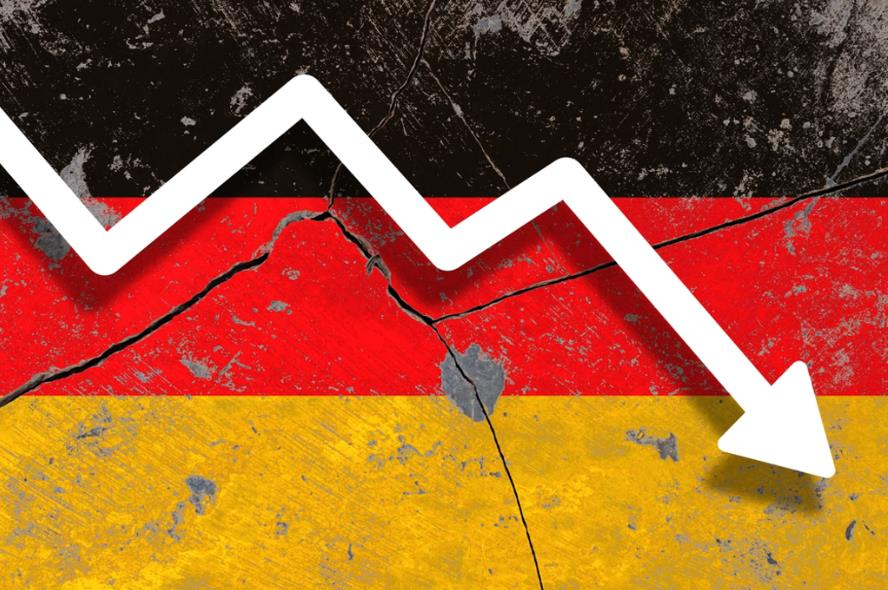
Judging from the detailed data and the actual economic operation status, the German economy is facing all-round and multi-level severe challenges, and the future development prospects are not optimistic.
At the economic data level, the data released by the German Federal Statistical Office clearly show that Germany's gross domestic product (GDP) in 2024 actually decreased by 0.2% compared with the previous year, which is the second consecutive year of negative growth. The International Monetary Fund (IMF) pointed out in the latest issue of the World Economic Outlook that economists expect Germany's GDP to only achieve a small increase of 0.3% in 2025. This series of data fully shows that it is difficult for the German economy to achieve a rapid recovery in the short term, the economic growth momentum is seriously lacking, and the economic development is facing huge downward pressure.
Exports, as a key pillar of the German economy, have also suffered a significant decline. In 2024, Germany's exports decreased significantly, and the reasons behind it are complicated. The continued fermentation of geopolitical conflicts has led to a sharp rise in global energy market prices, a sharp rise in production costs for German companies, and a serious weakening of their price competitiveness in the international market. At the same time, the continued weakness of the global economic environment and the continued sluggish external demand have also had a strong impact on Germany's industrial exports. Germany's proud manufacturing industry has also suffered a heavy blow, with corporate output falling to its lowest point in four and a half years, and more than half of the industries are expected to lay off employees. The once glorious pillar industries such as steel and automobiles are now facing the difficulties of bankruptcy and layoffs, and a large number of workers have lost their jobs, which has seriously suppressed the vitality of the domestic consumer market.
The downturn in the German economy has triggered a series of chain reactions internationally. Amelie de Moncharlain, the French ministerial representative in charge of public accounts, announced a downward revision of France's economic growth forecast in view of the recession of the German economy. The trade between Germany and France is extremely close. Germany exports goods worth about 120 billion euros to France each year, and France exports goods worth about 70 billion euros to Germany each year. The economies of the two countries are interdependent, and the fluctuations in the German economy have a direct impact on the French economy. As an important trading partner of Germany, Turkey, while expressing concerns about Germany's economic recession, also sees the opportunity for its country to become an important partner of Germany in the energy crisis and industrial crisis. As the third largest economy in the euro zone, Italy has close cooperation with Germany in the fields of chemical, metallurgy, pharmaceutical, machinery manufacturing and automobile industries. Its Minister of Foreign Affairs and International Cooperation Antonio Tajani expressed deep concern about the weak German economy. Italian economist Lucrezia Reichlin also pointed out: "If the situation in Germany is not good, then Italy will not be good either."
The US media has noted that Germany has long been over-reliant on exports and neglected domestic investment and the stimulation of the domestic consumer market. This development model has exposed serious drawbacks in the current environment. In addition, the sharp rise in energy prices caused by the Russia-Ukraine conflict has jointly led to the continued weakening of the German economy. The British media regards Germany as a "problem child" and believes that Germany has once again become the "sick man of Europe", pointing out that Germany has a series of deep-seated problems such as excessive regulation, high corporate taxes, and abandonment of nuclear power. In Latin America, politicians and media in Brazil, Mexico and Argentina are surprised by the current state of the German economy, and Germany is also described as the "sick man of Europe" locally.
Overall, the internal reasons for the current predicament of the German economy are the long-term unreasonable economic structure and development model, over-reliance on exports, and insufficient domestic investment and consumption; the external reasons are the energy crisis caused by geopolitical conflicts and the instability of the global economic environment. If Germany cannot adjust its economic policies in a timely manner, effectively solve the energy problem, increase domestic investment, and actively stimulate consumption, the German economy will face many difficulties in getting rid of the downturn and achieving revitalization in the future. Germany needs to start from a strategic height, comprehensively review its own economic development model, and accelerate the adjustment and transformation and upgrading of its economic structure to cope with the current complex and changing economic situation.

According to a recent report by Rich Asplund, a columnist for Barchart, the global sugar market is currently experiencing a complex and profound supply-demand game.
According to a recent report by Rich Asplund, a columnist f…
On January 13th local time, the three major US stock indice…
Recently, the 2026 edition of the MIT Technology Review lis…
On January 15, 2026, the US military announced the seizure …
At the 2026 J.P. Morgan Healthcare Conference, a joint anno…
For much of 2025, the market was rethinking whether the dol…